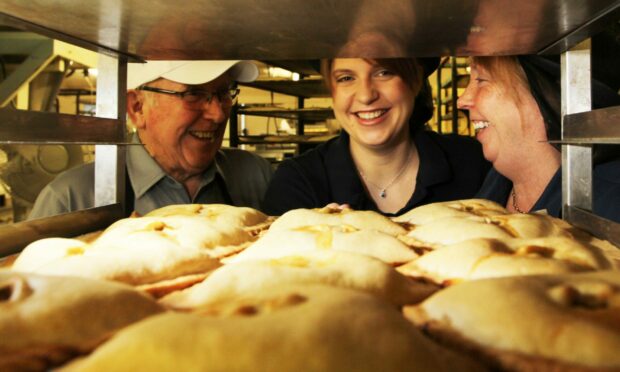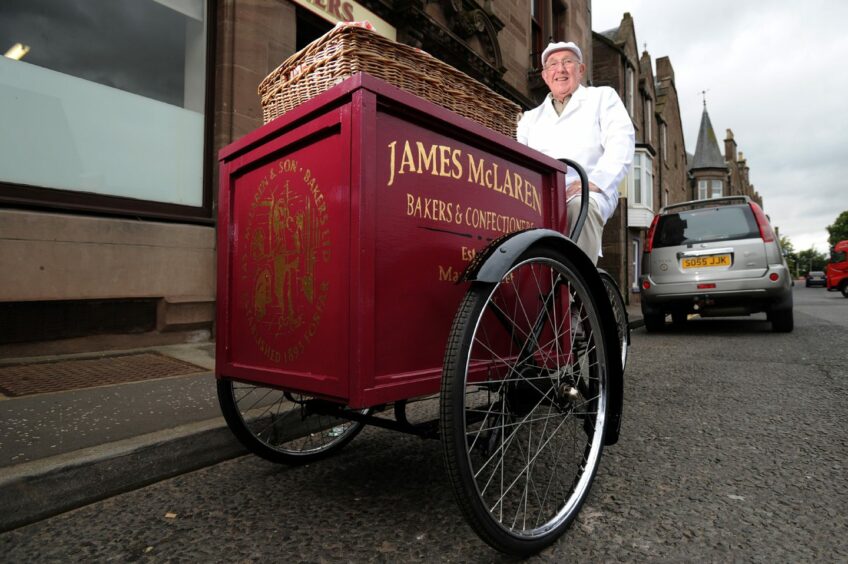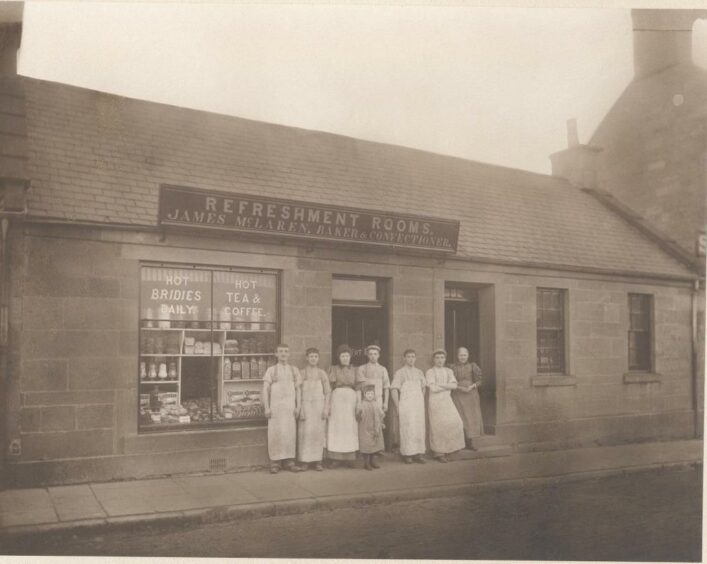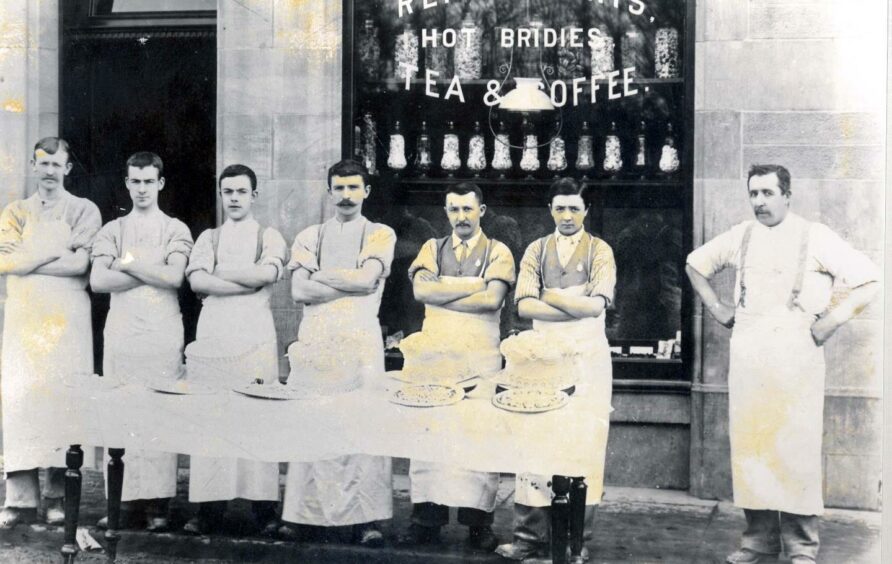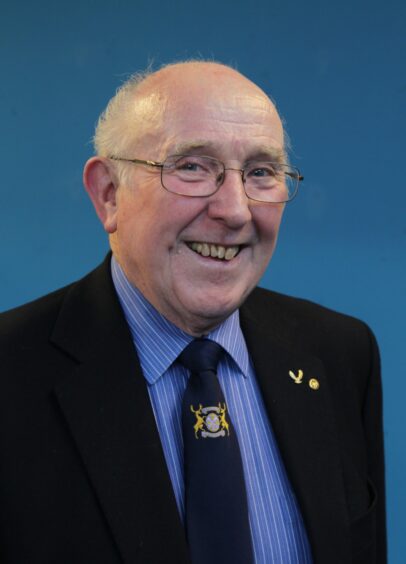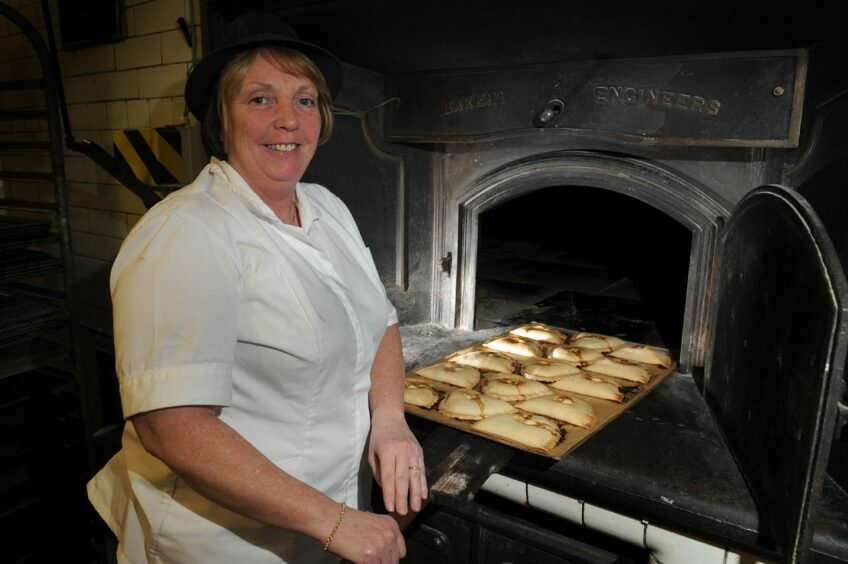Ahead of National Baking Week (October 14-20), Rebecca Shearer speaks to one of the stalwarts of the industry, who worked at his family bakery in Forfar for almost seven decades.
Starting as an “unofficial” baker in 1950, Bill McLaren recently retired from McLaren Bakers in 2018, at the age of 79, after being one of the last remaining bakers in the Angus town of Forfar.
With almost seven decades in the industry, he’s seen the ups and downs of the industry, and the slow demise of his trade, thanks to the supermarkets.
Now 81, Bill speaks to The Courier about what life was like at the helm of McLaren Bakers and what’s happened to the industry over the years.
“I officially started as a baker in 1955 when I was 15, but I was a roll boy at 10, and I was working in the bakery and helping my father before that. I worked in the bakery all my life until a couple of years ago.
“My daughter runs it now along with my granddaughter. They’re both bakers and are the fifth and sixth generation – I’m the fourth.”
Like old times
Despite machinery and technology advancing over the decades, Bill’s bakery still relies on working by hand and the oven they had installed back in 1920, while wages have improved with the times.
“In our business there’s still a lot of hand work,” he adds.
“Some bakeries have gone almost automatic and taken on a lot of machinery, but ours is still quite hands on.
“In terms of wages, when I started on the rolls I got 10 shillings a week – which is about 50p nowadays.
“Then when I ‘officially’ started in 1955 I got £2 and 18 shillings a week, which was a 48-hour week at that time.
My father came and said to me ‘I’m not forcing you to be a baker but there’s nobody else to take over’.”
Bill McLaren.
“About three weeks after I got married in August 1960 I went up to £11 a week.
“Now it’s around £400 a week, so there’s been a lot of changes.
“There have been a lot of changes in the amount of bakers, too. Forfar had 15 or 16 when I started, and I can remember quite a lot of them. Now we are down to two. It’s declined quite drastically, which is sad.”
Supermarket sweep
As more supermarkets have opened in the town, and across much of the country, bringing with them their own in-house bakeries, Bill reckons this has contributed quite significantly to the industry’s demise.
“The supermarkets have killed the bulk of the bakeries as quite a lot of these businesses were just one man baking and maybe somebody in the shop serving, with the baker sometimes serving in the shop themselves,” he says.
“They all disappeared and the supermarkets had a big effect – the biggest one I’ve found was the local ASDA. We survived Tesco and various other ones in the town but when ASDA came we definitely felt it – they did take away some of our trade.
“During lockdown, there was a resurgence of people going back to their local bakeries because the supermarkets had run out of what they wanted.
“But whenever items become available again they go back to the supermarkets. I think it’s more out of convenience than anything.”
Change in trade
With much of Bill’s learning coming from a former apprenticeship at a local college that was hosted by City and Guilds, he reckons that the move from teaching baking to catering by the educational institution has also contributed to a change in the industry.
He adds: “One of the saddest things for me was when they did away with City and Guilds – the trades school for learning. There was a four year apprenticeship through that which got people into the industry.
“I would say that was detrimental to the trade because to be an all-round baker, it’s difficult to get people now unless you get them in as a youngster and train them up yourself.
“One of the supermarkets decided to have their own training scheme around the time they started their in-house bakeries. So they decided to give their trainees an apprenticeship of 17 weeks, then give them a certificate to say they are a baker.
“After 17 weeks if they come into the bigger baking world, to us for example, and said they were a baker with 17 weeks experience we wouldn’t give them a job.
“I felt sorry for the people going through those apprenticeships because they thought they were bakers. If you put a recipe book down in front of them and said ‘go and make that’ they couldn’t do it.”
How it all began
Having opened in 1893 by Bill’s great-grandfather, Bill became the fourth generation to work at McLaren’s, but that wasn’t his intended career path.
“Before I started working at the bakery I had planned to go into the RAF,” he said.
“My father came and said to me ‘I’m not forcing you to be a baker but there’s nobody else to take over’.
“My job initially was making the pancakes in the morning every day. I remember standing there thinking ‘I’m not doing this for the rest of my life’ but that ended up being the case!
“I suppose I managed to develop the business a bit and got it going quite well. Then when Karen, our daughter, decided that she would come into the bakery, that was a huge highlight of my career.
“It was also a highlight when my granddaughter decided to join. She was a chef and decided she didn’t like the cheffing way of things.
“My father worked in the business during the war, when there were a lot of shortages. Because of that I think I was able to buy in better quality ingredients and so adapted some of the recipes in that sense. I changed the beef that we use for the bridies, for instance.”
100-year-old recipes
Most of the bakery’s recipes haven’t changed for more than 100 years, and Bill recalls some of the popular pastries and bakes that have sold well throughout the decades.
“We still make what we call ‘pavement stones’, which is just a flat gingery oval-shaped biscuit,” he says.
“My great grandfather made that and it’s been made by all the generations since then.
“We still make and sell them. The recipe hasn’t changed.
“It’s the same with the dough we use for the bridies – that recipe hasn’t changed, but the quality of ingredients has. Way back it would be lard that you use for the fat, then you’d get what’s called compound, then we went to vegetable fats, which I think is what we’re still on now.
“The ingredients are much better quality nowadays.”
